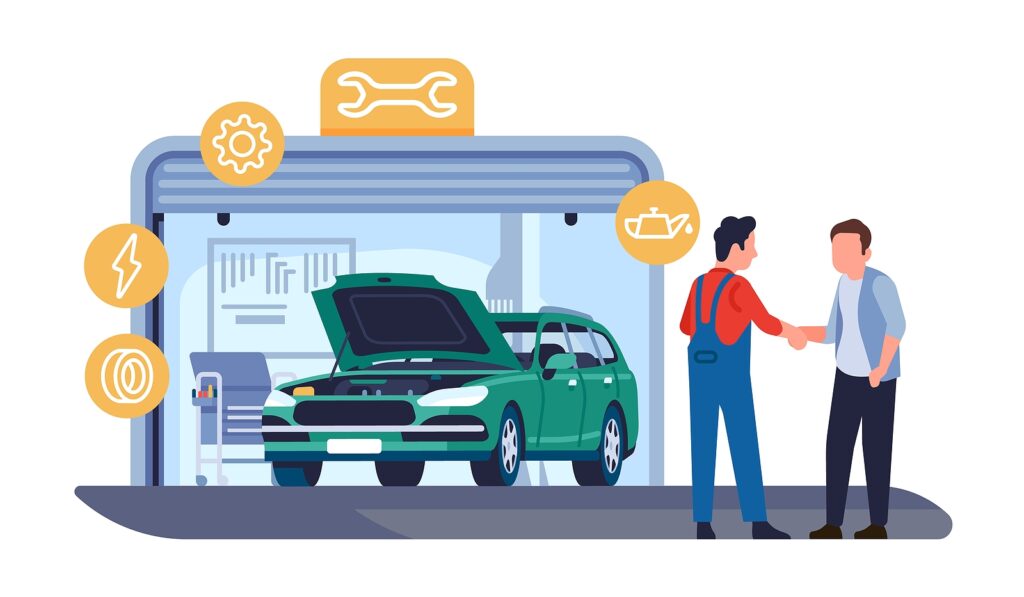In the fast-paced world of the automotive industry, change is the only constant. Vehicles have come a long way from their initial designs, shifting from basic machines to complex systems that harness the power of advanced technology. This blog post takes you on a journey – from the simple mechanic carburetors of yesteryears to the cutting-edge artificial intelligence (AI) transforming vehicles today.
We’ll delve into this fascinating evolution of automotive technology, shedding light on how AI is not only revolutionizing the way we drive but also shaping the future of the automotive industry. Strap in, as we drive down memory lane and speed towards a future fueled by AI.

The Beginning: Carburetors and the Birth of Cars
The first automobile in history was invented by Karl Benz in 1885, powered by an internal combustion engine fueled by gasoline. This early vehicle relied on a simple carburetor to mix air and fuel for combustion – the primary method of fuel delivery for cars until the late 1980s. The carburetor was essentially a tube with a narrowing in the middle, called a “venturi,” that created a drop in air pressure. This created suction to pull fuel from the gas tank and mix it with air, creating an atomized vapor that could burn efficiently in the engine.
The Rise of Fuel Injection
As cars became more powerful and efficient, carburetors were slowly phased out in favor of fuel injection systems, which precisely control the amount of fuel delivered to the engine. In the 1980s, electronic fuel injection (EFI) emerged, replacing mechanical carburetors with computer-controlled systems that could adjust fuel delivery based on various factors such as engine load and temperature.
Fuel injection offered significant benefits over carburetors, including improved fuel efficiency, reduced emissions, and better performance. As technology advanced, EFI systems became more sophisticated, with multiple injectors for each engine cylinder and the ability to constantly adjust fuel delivery for optimal performance.
The Age of Electronics
As the automotive industry entered the digital age, electronic systems began to play a crucial role in vehicles’ operation. Today’s cars are equipped with hundreds of sensors and microprocessors that monitor and control various functions, from engine performance to safety features. Electronic Control Units (ECUs) are the brains behind these systems, processing data from sensors and sending signals to different components to ensure optimal vehicle operation. The complexity of ECUs gave rise to even more advanced technology – artificial intelligence.
AI in the Automotive Industry
Artificial intelligence has been a game-changer in the automotive industry, with car manufacturers using it to develop smarter, safer, and more efficient vehicles. AI-powered systems have made their way into various aspects of vehicle operation, including:
Advanced Driver Assistance Systems (ADAS): These systems use sensors and cameras to detect potential hazards on the road and assist drivers in controlling their vehicles.
Autonomous Vehicles: With AI technology, the dream of self-driving cars is becoming a reality. Companies like Tesla, Google, and Uber are leading the charge in developing autonomous vehicles that can operate without human input.
Predictive Maintenance: Through machine learning algorithms, AI can analyze data from sensors and predict when a vehicle part may fail, enabling timely maintenance and reducing breakdowns.
Voice-activated Assistants: AI-powered virtual assistants like Amazon’s Alexa and Google Assistant are now being integrated into vehicles, allowing drivers to control various functions with voice commands.
Vehicle Production Advancements
AI has also played a crucial role in the production of vehicles. With the help of machine learning algorithms, manufacturers can optimize their supply chains and improve efficiency in manufacturing processes. As technology continues to advance, the automotive industry is set to undergo even more significant changes. With the advent of 5G networks and the Internet of Things (IoT), vehicles will become even smarter and connected, enabling a seamless driving experience.
AI will also play a crucial role in developing electric vehicles (EVs) by optimizing battery performance and extending range. Additionally, with AI-powered ride-sharing services, the need for individual car ownership may soon become a thing of the past.
Final Thoughts
In conclusion, from humble beginnings with carburetors to AI-powered vehicles and advanced technology, the evolution of automotive technology has been nothing short of impressive. As we look towards the future, one thing is certain – with AI at the helm, we can expect even more groundbreaking innovations in the automotive industry. The possibilities are endless, and the ride is just beginning. So, buckle up, because the journey of automotive technology has only just begun!
Searching for a reliable, experienced European automotive repair shop to service your technologically-advanced German vehicle? Look no further! Contact Autohaus Dierolf at 317-571-0800 for factory scheduled car maintenance in Carmel, Indianapolis. We are German-trained mechanics specializing in Mercedes Benz and all other European vehicles.
Related Posts:
Why a Mercedes Could Be Your Next Best Investment
Unique Features of European Cars that Make Them Stand Out
Common Technical Problems with Mini Coopers









